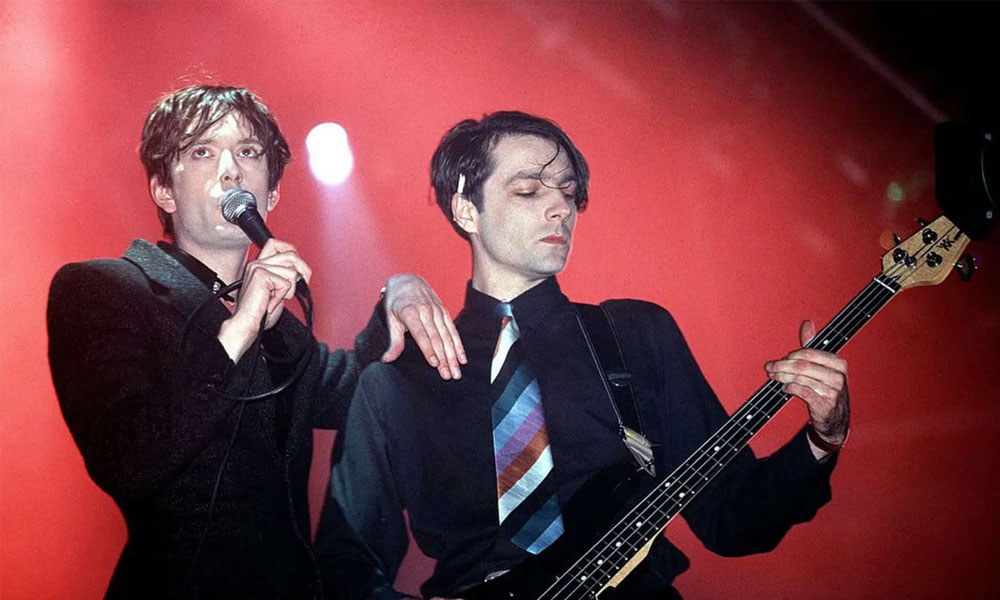News
Steve Mackey, Pulp Bassist And Producer, Dies At 56


Steve Mackey, the bass guitarist for Pulp during the band’s most successful years, has died aged 56.
His wife, stylist Katie Grand, announced the news on her Instagram page, writing; “After three months in hospital, fighting with all his strength and determination, we are shocked and devastated to have said goodbye to my brilliant, beautiful husband, Steve Mackey. Steve died today, a loss which has left myself, his son Marley, parents Kath and Paul, sister Michelle and many friends all heartbroken. Steve was the most talented man I have ever known, an exceptional musician, producer, photographer and filmmaker. As in life, he was adored by everyone whose paths he crossed in the multiple creative disciplines he conquered. I would like to express my heartfelt thanks to all the NHS staff who worked tirelessly for Steve. He will be missed beyond words.”
Mackey joined Pulp in 1989, first contributing to their third album Separations. He went on to play on all their subsequent studio albums, including the likes of Different Class and His ’n’ Hers which are regarded as high points in the mid-90s Britpop scene.
Pulp went on hiatus in 2002, but reformed for live performances across the world in 2011 and 2012. They released one final recording, an update of a demo track called After You, in 2013.
In October 2022, Mackey announced that he wouldn’t be joining Pulp for their latest set of reunion concerts in summer 2023. “I’m exceptionally proud of the body of work we’ve created together…however I’ve decided to continue the work I’m engaged in – music, film-making and photography projects.” He wished the band well and thanked the group’s “amazing fanbase.”
In a band statement posted on social media following his death, Pulp described Steve Mackey as a “beloved friend” and pictured him hiking in the Andes during the group’s 2012 reunion. “Steve suggested we go climbing…So we did. & it was a completely magical experience. Far more magical than staring at the hotel room wall all day. Steve made things happen. In his life & in the band. & We’d very much like to think that he’s back in those mountains now, on the next stage of his adventure.”
With his sharp tailoring, drooping quiff and model good looks, Mackey brought raffish cool and driving, disco-influenced rhythm to the Sheffield band, whose first two albums, recorded with different bassists in 1983 and 1987, had been minor cult hits in the British indie scene. Mackey, who was born in Sheffield and went to school with another of the city’s future music stars, Richard Hawley, played in other local bands such as Trolley Dog Shag but started following Pulp and befriended frontman Jarvis Cocker.
Mackey joined Pulp 1989, and his enthusiasm for dance music helped steer the band towards the strutting uptempo sound that would prove hugely popular in the mid-90s. “We were grossly unsuccessful for 10 years, but it was an important time to be gestating,” Mackey reflected in 2019. “You pick up things and get better. But today, economics would make that more difficult to achieve.”
Their first album with Mackey, Separations, brought a slight uptick to the band’s success and paved a move to major label, Island Records. Then His’n’Hers reached the UK Top 10 in 1994 and its successor, Different Class, powered by the anthemic single “Common People,” reached No 1, as did its psychically fraught follow-up This Is Hardcore. A final album, We Love Life, was released in 2001.
Outside of Pulp, Mackey collaborated with an impressive range of musicians as a producer, co-writer and mixer. He co-wrote and produced songs on Florence + the Machine’s debut album Lungs; co-produced the breakthrough MIA single “Galang,”worked on early recordings by the Horrors; and continued to collaborate with Cocker on the latter’s solo recordings. He later partnered with Daft Punk producer Thomas Bangalter to produce tracks on Arcade Fire’s album Everything Now, and worked with Spiritualized on 2018 album And Nothing Hurt.

-
Paul McCartney And Wings To Release Historic Live Album ‘One Hand Clapping’
-
Elton John Earns Multi-Platinum Plaque For ‘Diamonds,’ Shares ‘Step Into Christmas’ EP
-
Jon Batiste Announces ‘Uneasy Tour: Purifying The Airwaves For The People’
-
Best Political Punk Songs: 20 Essential Anti-Establishment Tirades





